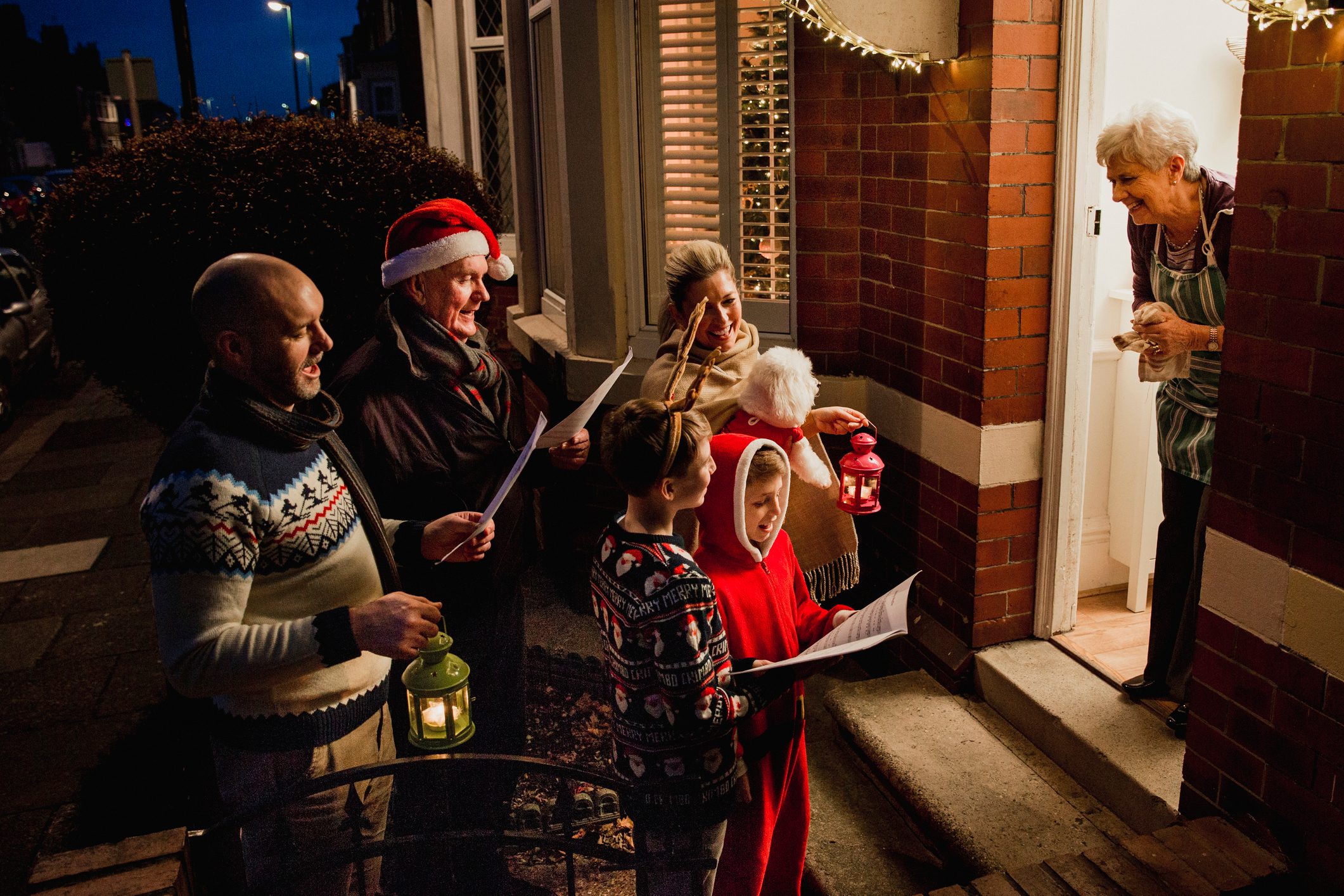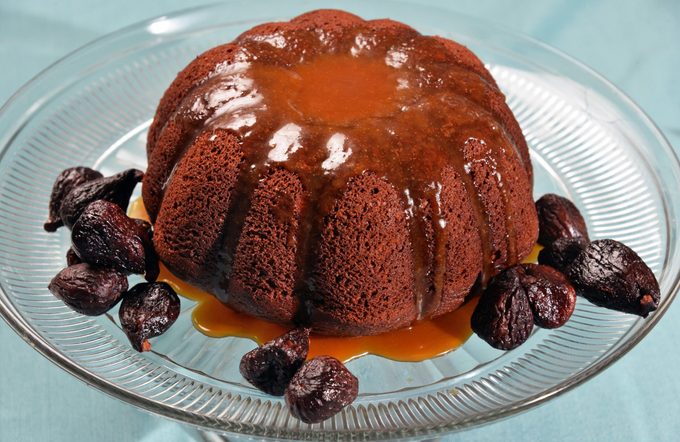Discover the meanings of those holly, jolly words

12 Christmas Carol Lyrics That Make No Sense—Explained!

There’s no escape. No matter where you are this time of year (the mall, the doctor, the supermarket, a party or an elevator), you’ll hear Christmas music. And if you’re like me, you’ll mindlessly sing along to those catchy, familiar tunes. But have you ever really listened to some of the lyrics?
Many of our most popular holiday songs are from the 19th century, when Christmas became a huge deal in Europe and the United States and when today’s traditions started to take shape. So these classic tunes are rife with symbolism and images that we’ve come to associate with the holiday. “Bringing the oldest remnants of Christmas into the language of Christmas today,” says Michael Adams, PhD, a professor of English and linguistics at Indiana University, “I think there’s something a little magical about that.”
Christmas carols are filled with old-fashioned and (dare I say?) strange words that you probably won’t come across anywhere else. Some of the terms are even obsolete. But that doesn’t matter, according to Adams. Such words are “atmospheric and not necessarily important in their meaning,” he says. “But they set the scene.”
So to quote a more recent holiday playlist staple, if all you want for Christmas is to learn the meaning of a dozen old-timey, charming Christmas song lyrics, read on.
Get Reader’s Digest’s Read Up newsletter for more holidays, humor, travel, tech and fun facts all week long.
Bobtails in “Jingle Bells”
Lyric: “Bells on bobtails ring”
When “Jingle Bells” was written in 1850, horses pulling sleighs were often adorned with bells as a way to warn other riders (think of them as a precursor to car horns). A bobtail refers to a horse with its tail cut short or tied up, which was a common practice, as it kept the horse’s tail from getting tangled in the equipment.
Per the Oxford English Dictionary, the term bob can refer to any sort of lumpy thing at the end of something else. “We don’t talk about bobtails now because we don’t use horses very much, but it’s really the same bob as a bob hairstyle—just that it’s been transferred to the human head instead of the wrong end of the horse, so to speak,” says Adams.
Yuletide in “The Christmas Song”
Lyric: “Yuletide carols being sung by a choir”
Though this song wasn’t written until 1945, it contains one of the oldest words on this list: yule. Druids and other pagans celebrated Yule, or the winter solstice, way before Christianity became widespread in Europe. Parts of that celebration, like the yule log (a tree or branch being burned in a hearth) and yuletide (the name for the time of year), were later incorporated into Christmas traditions.
Today, yuletide has evolved to refer to the holiday season. So when Nat King Cole sings about Yuletide carols, he just means Christmas songs.
Boughs in “Deck the Halls”

Lyric: “Deck the halls with boughs of holly”
Boughs are tree branches or tree limbs. If you’re using them to deck your halls or decorate your home, you’re probably hanging greenery on your mantel or staircase railing. But here’s a fascinating fact, according to Laurel Brinton, PhD, professor emerita at the University of British Columbia in Vancouver, Canada: A now obsolete meaning for bough was “a shoulder of an animal.” She says this probably means that, at some point, someone thought a branch resembled the shoulder of an animal.
Troll in “Deck the Halls”
Lyric: “Troll the ancient Yuletide carol”
Yep, there’s another unusual word in this song with a melody from a Welsh New Year’s Eve drinking song and English lyrics dating to 1862. Today, the word troll makes us think of creatures who live under bridges or harassers on the internet, but that’s not what it means here. Some experts believe that troll, in this instance, means “to sing in a full voice.”
But Adams disagrees. He thinks the word evolves from trollen, an infinitive form of a Middle English verb that means “wandering around.” When you sing this line of “Deck the Halls,” you’re referring to “taking [the carol] out into the streets, wandering around and going from house to house singing so that everybody can hear it,” Adams says. Far from a funny term in a Christmas song, trolling sounds flat-out fun.
Wassailing in “Here We Come A-Wassailing”
Lyric: “Here we come a-wassailing”
Speaking of fun: A-wassailing is the tradition of drinking while going from door to door. According to Brinton, wassail comes from the noun for a salutation used when presenting a cup of wine or liquor, “like a spiced ale on Twelfth Night or Christmas Eve,” to a guest. And in both Old English and Old Norse, that greeting translates to “Be you hale,” wishing good health on your drinking buddy.
A few historians have traced parts of this ancient custom and the song as far back as the fifth century, according to the book More Stories Behind the Best-Loved Songs of Christmas by Ace Collins.
Round yon virgin in “Silent Night”
Lyric: “Round yon Virgin, mother and child”
Written in German as “Stille Nacht!” in 1818 by an Austrian priest and a schoolteacher, this Christian Christmas song debuted at midnight mass. By the U.S. Civil War, “Silent Night” had become America’s most popular Christmas carol, according to Collins’s Stories Behind the Best-Loved Songs of Christmas. This line depicts the peaceful scene in a long-ago manger in Bethlehem, where all is calm and all is bright around (round) that (yon) Virgin (Mary, the mother of Jesus).
Figgy pudding in “We Wish You a Merry Christmas”

Lyric: “Oh, bring us a figgy pudding”
Though the origins of this tune can be traced all the way back to the 16th century, if you’re not British, you’re likely unfamiliar with figgy pudding, a traditional English dessert often associated with Christmas. Despite its name, it’s not a pudding: It’s more of a steamed cake made with alcohol and dried fruit—but not always figs.
For a while, “fig was a synonym for ‘raisin’ in English,” says Adams, and it could refer to any sort of dried fruit. Though people in England knew what figs were, Adams notes, the fruits were exotic (native to the Mediterranean and Asia Minor), so “that’s not what most people in England were putting into their puddings”—at least not back then.
God rest ye merry in “God Rest Ye Merry, Gentlemen”
Lyric: “God rest ye merry, gentlemen. Let nothing you dismay.”
This song’s composer is unknown, but Collins says there are records of it being sung as far back as the 15th century. The meaning of the phrase, according to the Oxford English Dictionary, is “may God grant you peace and happiness.”
But Brinton says “the syntax is what’s interesting here.” The comma is placed after merry and before gentlemen, which means God is wishing the gentlemen merriment, not that they are “merry gentlemen” being addressed. See how essential commas are?
Five-and-ten in “It’s Beginning to Look a Lot Like Christmas”
Lyric: “Take a look at the five-and-ten; it’s glistening once again”
This song, written in 1951 by Meredith Willson, was a hit for Perry Como, but numerous artists have since covered it, from Bing Crosby to Pentatonix to Michael Bublé. A five-and-ten (or five-and-dime) is a type of discount store that was popular in the United States in the mid-20th century, where items were priced at 5 and 10 cents. Think of it as the 1950s’ version of a dollar store. In this line, the store is glistening—decorated with festive displays and bustling with holiday shoppers.
Gladsome tidings in “Angels We Have Heard on High”
Lyric: “What the gladsome tidings be which inspire your heavenly song?”
Though this song was first published in French in 1855, Collins says records indicate that it had been used in church masses for more than 50 years before that. There are two unusual words in this noel. Gladsome is just glad with the suffix some, meaning “characterized by,” tacked on. Adams speculates that “the meter of the carol” is the reason gladsome was used, though the words have the same meaning: Glad by itself just wouldn’t work.”
As for tidings, it’s an archaic word that means “news or information.” The “gladsome tidings” here refer to the announcement of Jesus Christ’s birth.
Tannenbaum in “O Tannenbaum”
Lyric: “O tannenbaum, how lovely are thy branches”
Tannenbaum is the German word for “fir tree,” and the song (which some experts believe was written in medieval times) celebrates its beauty and resilience. An interesting note here: As Collins points out in his book More Stories Behind the Best-Loved Songs of Christmas, if England’s Queen Victoria and Prince Albert of Germany hadn’t wed in 1840, and if the groom hadn’t brought his native country’s holiday traditions with him, the Christmas tree might not have become a worldwide symbol of the holiday season.
Jubilee in “Santa Claus Is Comin’ to Town”
Lyric: “The kids in girl and boy land will have a jubilee”
This cheerful tune was written in 1934 and has been recorded by numerous artists, from Frank Sinatra to Dolly Parton to Bruce Springsteen. Per the Oxford English Dictionary, the word jubilee has been in the English language since the 14th century and originally meant a year of emancipation and restoration in the Jewish faith, which was to be kept every 50 years. Later, the term came to mean any 50-year celebration (say, of a monarch’s reign). Eventually, says Brinton, “it lost its sense of 50th, and it just meant general or public rejoicing.”
The kids in this song are anxiously awaiting Santa Claus and certainly will have a huge celebration when he arrives. And with that, it’s time for you to turn up the Christmas carols and have a jubilee of your own this holiday season.
About the experts
|
Why trust us
At Reader’s Digest, we’re committed to producing high-quality content by writers with expertise and experience in their field in consultation with relevant, qualified experts. We rely on reputable primary sources, including government and professional organizations and academic institutions as well as our writers’ personal experiences where appropriate. We verify all facts and data, back them with credible sourcing and revisit them over time to ensure they remain accurate and up to date. Read more about our team, our contributors and our editorial policies.
Sources:
- Michael Adams, professor of English and linguistics at Indiana University Bloomington; phone interview, Dec. 11, 2024
- Laurel Brinton, professor emerita at the University of British Columbia in Vancouver, Canada; phone interview, Dec. 10, 2024
- Oxford English Dictionary: “Bob-tail”
- Oxford English Dictionary: “Bough”
- Oxford English Dictionary: “Figgy pudding”
- Oxford English Dictionary: “Jubilee”
- Oxford English Dictionary: “Rest”
- Oxford English Dictionary: “Troll”
- Oxford English Dictionary: “Wassail”
- Oxford English Dictionary: “Yule”
- Stories Behind the Best-Loved Songs of Christmas by Ace Collins
- More Stories Behind the Best-Loved Songs of Christmas by Ace Collins
- Music Master: “Unpacking the Joy: We Wish You a Merry Christmas Lyrics And Its Meaning!”
- CBC: “Deck the Halls Christmas Song Began as Competitive Welsh New Year’s Eve Drinking Song”























